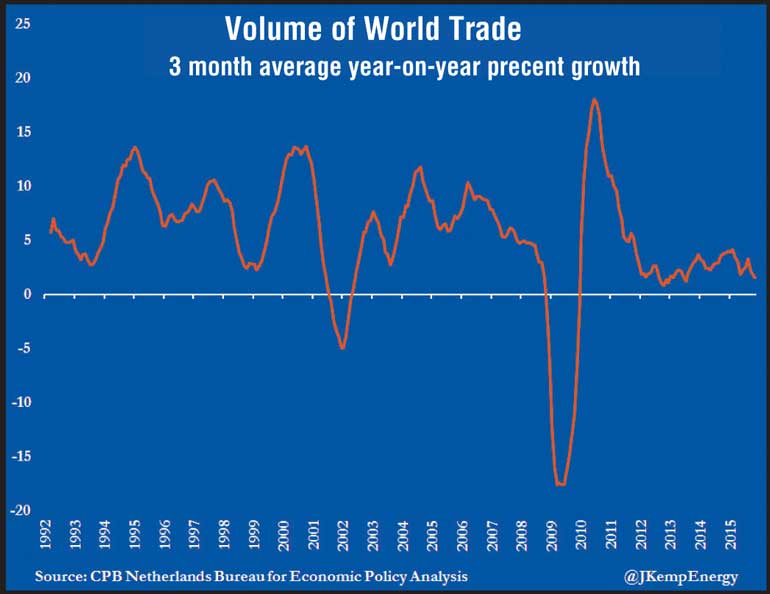Wednesday Feb 25, 2026
Wednesday Feb 25, 2026
Monday, 1 February 2016 00:00 - - {{hitsCtrl.values.hits}}

Reuters: Growth in world trade is slowing as the slump in commodity prices and a faltering economy in China combine to restrict shipments of manufactured items and raw materials around the globe.
World trade volumes rose by just 1.5% in the three months between September and November compared with the same period a year earlier, according to the Netherlands Bureau of Economic Policy Analysis.
Volume growth has been much weaker during the current economic expansion than during previous cycles, but it has slowed even further since early 2015.
Volume growth has fallen from 4.2% in the 12 months ending December 2014/February 2015 to just 1.5% in the 12 months ending September 2015/November 2015.
Volumes are growing at some of the slowest rates reported since the global financial crisis in 2008/2009 and before that the U.S. recession in 2000/2001 and the Asian financial crisis 1997/1998.
The slowdown in trade is hitting demand for all forms of transportation, from container and dry bulk shipping to road, rail and air freight.
Container and dry bulk shipping industries, which carry the majority of world trade by volume, have been hit by a combination of stagnating demand and a surge of large new vessels.
But the volume of cargo carried by airlines, which accounts for many higher-value items, was also flat or falling for much of 2015, according the International Air Transport Association.
Sluggish growth in global trade is in turn hitting the demand for fuel.
Most freight moves using fuels derived from the middle and bottom of the distillation column: jet fuel, diesel and heavy fuel oil.
These freight-related fuels are currently showing the weakest demand, biggest increase in stocks and weakest prices around the world.
For example, U.S. stocks of jet fuel, distillate fuel oil and residual fuel oil are 15%, 20% and 33% higher than at the same time last year, while gasoline stocks have risen by less than 2%.
Stocks of jet fuel, distillate and residual fuel oil are up by 5 million, 28 million and 11 million barrels respectively, while gasoline stocks are just 4 million barrels higher, according to the U.S. Energy Information Administration.
The oversupply of medium and heavy fuels, which are also used for space heating, is being made worse by El Nino, which has resulted in a much warmer than usual winter across most of the northern hemisphere.
Oversupply has pushed refining margins for middle distillates to the lowest since 2010, when the global economy was just emerging from the aftermath of the financial crisis.